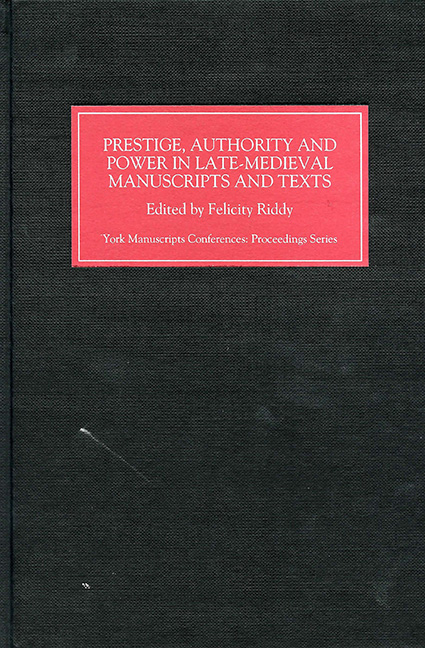Book contents
- Frontmatter
- Contents
- List of Plates
- Introduction
- Inventing Authority: Glossing, Literacy and the Classical Text
- Manuscripts of Nicholas Love's The Mirror of the Blessed Life of Jesus Christ and Wycliffite Notions of ‘Authority’
- The Patronage and Dating of Longleat House MS 24, a Prestige Copy of the Pupilla Oculi Illuminated by the Master of the Troilus Frontispiece
- Limner-Power: A Book Artist in England c. 1420
- A Poet's Contacts with the Great and the Good: Further Consideration of Thomas Hoccleve's Texts and Manuscripts
- The Politics of Book Ownership: The Hopton Family and Bodleian Library, Digby MS 185
- Piety, Politics and Persona: MS Harley MS 4012 and Anne Harling
- The Abbess of Malling's Gift Manuscript (1520)
- ‘Plutarch's’ Life of Agesilaus: A Recently Located New Year's Gift to Thomas Cromwell by Henry Parker, Lord Morley
- Manuscripts after Printing: Affinity, Dissent and Display in the Texts of Wyatt's Psalms
- Index of manuscripts
- Index of names and titles
- York Medieval Press: Publications
The Politics of Book Ownership: The Hopton Family and Bodleian Library, Digby MS 185
Published online by Cambridge University Press: 24 October 2017
- Frontmatter
- Contents
- List of Plates
- Introduction
- Inventing Authority: Glossing, Literacy and the Classical Text
- Manuscripts of Nicholas Love's The Mirror of the Blessed Life of Jesus Christ and Wycliffite Notions of ‘Authority’
- The Patronage and Dating of Longleat House MS 24, a Prestige Copy of the Pupilla Oculi Illuminated by the Master of the Troilus Frontispiece
- Limner-Power: A Book Artist in England c. 1420
- A Poet's Contacts with the Great and the Good: Further Consideration of Thomas Hoccleve's Texts and Manuscripts
- The Politics of Book Ownership: The Hopton Family and Bodleian Library, Digby MS 185
- Piety, Politics and Persona: MS Harley MS 4012 and Anne Harling
- The Abbess of Malling's Gift Manuscript (1520)
- ‘Plutarch's’ Life of Agesilaus: A Recently Located New Year's Gift to Thomas Cromwell by Henry Parker, Lord Morley
- Manuscripts after Printing: Affinity, Dissent and Display in the Texts of Wyatt's Psalms
- Index of manuscripts
- Index of names and titles
- York Medieval Press: Publications
Summary
The possession and use of books as a means of registering and affirming cultural identity within both private and public spheres is a familiar, and transhistorical, phenomenon. A more precisely focused insight into the roots of this phenomenon during the medieval period, one dependent upon the recognition of historical contingency, has come to characterize much of the recent work on the book collections established by royal and noble patrons in England. It is now widely accepted, for example, that the volumes acquired from Flemish workshops by Edward IV and various of his associates, both in the choice of subject matter and in their lavishness of production, served to ally the Yorkist regime with a politically and culturally dominant elite within the French-speaking north of Europe. But significant as the book-collecting activities of members of this particular class undoubtedly were, any analysis of cultural formations in England during the later Middle Ages should also acknowledge the centrality of the gentry as commissioners and owners of books for, just as the gentry's power as a social and political force within the country was developing during this period, so this grouping formed a major – and expanding – constituency for those involved in the professional production of books. It is this coincidence, or interrelationship, between the political and the more broadly defined `cultural', that I intend to explore in the following discussion of Oxford, Bodleian Library, MS Digby 185.
Digby is notable as a book for the generic eclecticism of its contents – which range from the Middle English Brut (this version of which ends with the capture of Rouen by the English in January 1418/19, fols. 1r–79r); to poems by Hoccleve (The Regement of Princes, and the Gesta Romanorum tales of the Emperor Gereslaus and of Jonathas, from the so-called Series, fols. 80r–144v, 145r–157r, 157r–165r); to a (near-) contemporary translation into English of the French prose romance of Ponthus et Sidoine (fols. 166r–203r); and for its decoration, which consists primarily of armorial shields incorporated within elaborate initials which, in the main, are placed at the openings of the texts that now comprise the volume. The manuscript's connection with the gentry family of Hopton has long been accepted.
- Type
- Chapter
- Information
- Publisher: Boydell & BrewerPrint publication year: 2000

